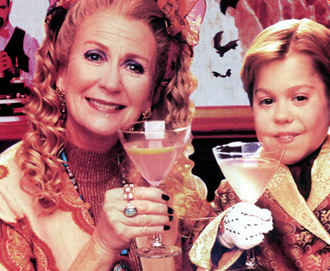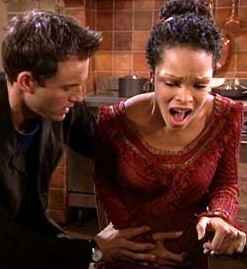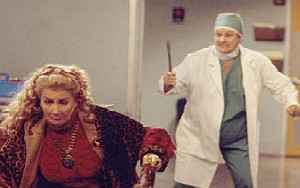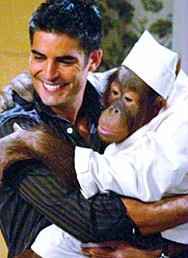|
Passions When The Guiding Light opened the era of televised soap operas in 1952, its creators could scarcely have imagined that the genre would eventually evolve to produce the gleefully bizarre and misanthropic viewing experience known as Passions.
When The Guiding Light opened the era of televised soap operas in 1952, its creators could scarcely have imagined that the genre would eventually evolve to produce the gleefully bizarre and misanthropic viewing experience known as Passions.Wedding a keen ear for soap opera cliche with an obnoxious love for fetishistic extremes, Passions is not so much a parody of a soap opera as a completely straightforward soap opera in which all the normal ingredients are taken to absurd extremes.
Many longtime Days fans were horrified by the liberties Reilly took with their beloved characters and his callous disregard for previous continuity—a key element in most soaps, especially those that have run for decades. Reilly left Days to create Passions, which NBC hoped would recreate the ratings success Reilly had experienced on Days. Freed from any requirement to placate pre-existing fans, Reilly crafted a venue for his most deranged imaginings, the small New England town of Harmony. Passions employs a series of innovative storytelling strategies which endear it to some fans and infuriate others. These include:
Endless Recaps: Presumably, the producers of Passions expect that people only watch the show two or three days a week. Every single episode is packed with endless recaps and flashbacks of what happened in previous episodes, even when what happened previously is nothing (as is often the case).
Total Amorality of Viewpoint: While individual characters are often highly moralistic, the show itself is grounded in a completely amoral worldview in which just about anything is fair game. Although the show's audience is mostly made up of teenage girls, Passions seems to delight in sending these impressionable youths such messages as "incest is romantic" and "girls get raped because they're slutty." The show also sends the message that it's OK to win over your true love using pacts with the devil, date-rape drugs or whatever else happens to be at hand. Unreasonable Fakeouts (aka "Your baby is dead."): As a rule, you can't trust anything on Passions unless it's gone on for at least two episodes. The writers delight in showing much anticipated scenes (such as lovers reuniting) for an entire episode, only to have them turn out to be a dream after a ludicrous amount of time has passed. This also manifests in every single Passions scene involving a sick baby; a doctor emerges with a grim face, everyone assumes the baby is dead, and they rant hysterically for 20 or 40 minutes, until the doctor belatedly pipes up and says, "No, no, your baby is fine!"
Unlike most other soaps, however, the families of Harmony are a decidedly multicultural bunch. The wealthy scions of the town are the lily-white Cranes, the wealthiest family in the world, whose mogul-patriarch Alistair Crane (much like another famous A.C.) is the embodiment of evil. Alistair is also a stark-raving racist, a fact that fuels much of Harmony's activity.
Other characters in Harmony included Charity Standish, a strange-looking young woman with mystical powers, and her nemesis, Tabitha Lenox, a centuries-old witch who keeps the forces of Hell in her basement. Sam Bennett, Harmony's chief of police, has exactly two approaches to the many, many crimes that take place in his jurisdiction—he either instantly solves them without explanation, or never, ever, ever solves them. As you might expect, most crimes fall into the latter category.
But Luis only has eyes for long-suffering heiress Sheridan Crane, whom he has pursued across several lifetimes with the assistance of reincarnation. According to the show's lore, there are two reasons why Sheridan and Luis can never be together:
These two factors ensure that Luis and Sheridan will face an ever-more-ridiculous series of obstacles to their love. Not that anyone else in town finds love an easier row to hoe. The couples who manage to hook up for any length of time are invariably separated by the emergence of a dark secret from the past. Passions has enjoyed a recent run of mainstream buzz thanks to one of the more noteworthy dark secrets to emerge from the past, the fact that teen supercouple Chad Harris and Whitney Russell are half-brother and sister. The "oops, it's incest" storyline is a hoary old soap opera standard, but Passions has extended the concept to its typical extreme. The classic formula is "boy meets girl, boy and girl fall in love, boy discovers he is girl's brother, relationship is shattered forever and everyone moves on with their lives." But that would be far too easy.
Whitney tricked everyone into believing another guy was the father of her baby (including the other guy and Chad). Although she was morally incapable of getting an abortion, she didn't have any problem trying to starve herself into a miscarriage while repeatedly fantasizing about giving birth to a monstrous Satan-spawn deformity. However, shortly before the delivery, Chad announced that he was still in love with Whitney despite the fact that she was his sister, and he proposed that the two live together chastely for the rest of their lives (a proposal met with some skepticism by everyone else). Whitney declined his offer, but confided to her best friend that she was still in love with Chad. Just for the record, we predict that this story will eventually conclude with a revelation that Whitney and Chad are not in fact brother and sister. But fakeout or not, the incest storyline has created quite a stir, winning Passions repeated mentions in mainstream magazines like Entertainment Weekly, which rarely deign to notice that soap operas exist, let alone that you might want to watch one.
In addition to its valuable advertising demographic, Passions has also turned to more innovative ways of making money, including extreme product placement for everything from water filters to cat food. The most visible example was a marketing deal the show signed with Mark Cosmetics, a multi-level marketing deal that aimed to be the Mary Kay of the teen set. The character of Jessica Bennett was repurposed so that her entire function on the show was to hawk Mark cosmetics to the other characters. The alliance ended early in 2005. Immediately after "quitting her job" with Mark, Jessica Bennett promptly donned slutty clothes, began drinking heavily, got herself drugged and date-raped (which, according to the show's philosophy, is her own fault) and slashed herself repeatedly with razor blades. One can infer from all this that there may have been a few hard feelings about the end of Mark's contract with the show. Let the product placement buyer beware. |
 Debuting on NBC in 1999, Passions was the brainchild of veteran soap writer James E. Reilly, who had made a name for himself by transforming the venerable Days of Our Lives into a freak show throughout the 1990s. His plotting verged on the ridiculous, perhaps most infamously with the
Debuting on NBC in 1999, Passions was the brainchild of veteran soap writer James E. Reilly, who had made a name for himself by transforming the venerable Days of Our Lives into a freak show throughout the 1990s. His plotting verged on the ridiculous, perhaps most infamously with the  Infinite Time Scaling: Historically, soaps have roughly paralleled the passage of real time, i.e., one episode generally corresponds to about one day of story time (with exceptions for weddings and special events). On Passions, about 10 to 12 story days pass in the course of an entire year of episodes. A single day can take months to play out in episodes, at which point the next day magically starts and winter has become spring without explanation. It's not uncommon for Valentine's Day to take place one story day after New Year's Eve, for instance. No one ever comments on this, even when the scaling bizarrely impacts pregnancies (such as a recent case which played out over 11 months of television but only lasted four story days, of which the character showed a belly for only a week before delivering her child).
Infinite Time Scaling: Historically, soaps have roughly paralleled the passage of real time, i.e., one episode generally corresponds to about one day of story time (with exceptions for weddings and special events). On Passions, about 10 to 12 story days pass in the course of an entire year of episodes. A single day can take months to play out in episodes, at which point the next day magically starts and winter has become spring without explanation. It's not uncommon for Valentine's Day to take place one story day after New Year's Eve, for instance. No one ever comments on this, even when the scaling bizarrely impacts pregnancies (such as a recent case which played out over 11 months of television but only lasted four story days, of which the character showed a belly for only a week before delivering her child).
 Extreme Suspension of Disbelief: Most television requires some suspension of disbelief, but good television provides internal consistency and logic. When you watch Passions, you get the distinct impression that its plots are based on the rule of "Hey, wouldn't it be cool if we did this?" and nothing else. There is no effort to make story developments consistent with common sense, or even consistent with what happened five minutes earlier. This allows a great deal of creative freedom, but requires extremely tolerant viewers. Imagine watching two six years olds playing with dolls and you'll get the general idea.
Extreme Suspension of Disbelief: Most television requires some suspension of disbelief, but good television provides internal consistency and logic. When you watch Passions, you get the distinct impression that its plots are based on the rule of "Hey, wouldn't it be cool if we did this?" and nothing else. There is no effort to make story developments consistent with common sense, or even consistent with what happened five minutes earlier. This allows a great deal of creative freedom, but requires extremely tolerant viewers. Imagine watching two six years olds playing with dolls and you'll get the general idea.
 Despite these innovations and a wicked sense of humor (that surfaces most often in over-the-top fantasy sequences), Passions exploits the usual soap conventions to great effect, and often to absurd extremes, including the "peering in the window" scene, the "gratuitously shirtless male" scene, the "long thoughtful look before a commercial break" scene and the "uber-romantic spur-of-the-moment candle-lit picnic" scene. In keeping with Soap Opera 101, the show also features three or four key families whose members come from different classes of society.
Despite these innovations and a wicked sense of humor (that surfaces most often in over-the-top fantasy sequences), Passions exploits the usual soap conventions to great effect, and often to absurd extremes, including the "peering in the window" scene, the "gratuitously shirtless male" scene, the "long thoughtful look before a commercial break" scene and the "uber-romantic spur-of-the-moment candle-lit picnic" scene. In keeping with Soap Opera 101, the show also features three or four key families whose members come from different classes of society.  On the other end of the economic spectrum is the Lopez-Fitzgerald clan, the product of marriage between the long-suffering Pilar Lopez and the long-absent Martin Fitzgerald. The kids tend to be far more Hispanic than Irish, despite the fact that most of the actors portraying them are visibly unable to speak Spanish.
On the other end of the economic spectrum is the Lopez-Fitzgerald clan, the product of marriage between the long-suffering Pilar Lopez and the long-absent Martin Fitzgerald. The kids tend to be far more Hispanic than Irish, despite the fact that most of the actors portraying them are visibly unable to speak Spanish.  The third-most prominent family are the African-American Russells. Matriarch Eve Russell harbored a secret past as a drug addict and loose woman who had a torrid affair with Julian Crane (son of Alistair), before becoming a doctor specializing in everything from pediatrics to brain surgery. Her husband, T.C., has a bad temper that leads to frequent and hilarious fight scenes that you really have to see to appreciate.
The third-most prominent family are the African-American Russells. Matriarch Eve Russell harbored a secret past as a drug addict and loose woman who had a torrid affair with Julian Crane (son of Alistair), before becoming a doctor specializing in everything from pediatrics to brain surgery. Her husband, T.C., has a bad temper that leads to frequent and hilarious fight scenes that you really have to see to appreciate.  Then there's the Wallace family, with psychotic daughter Beth,
Then there's the Wallace family, with psychotic daughter Beth,  First, Passions clued in viewers to the fact that Whitney and Chad were siblings very early, then lingered adoringly over their hot, steamy sex scenes for months. Then, Whitney became pregnant. Five minutes later, she discovered Chad was her half-brother.
First, Passions clued in viewers to the fact that Whitney and Chad were siblings very early, then lingered adoringly over their hot, steamy sex scenes for months. Then, Whitney became pregnant. Five minutes later, she discovered Chad was her half-brother.  The buzz has not translated into ratings, however. Passions is the lowest-rated soap on network television, and its numbers have barely moved in its six years on the air. However, its demographic performance among teenage girls is strong enough that NBC isn't likely to pull the plug any time soon.
The buzz has not translated into ratings, however. Passions is the lowest-rated soap on network television, and its numbers have barely moved in its six years on the air. However, its demographic performance among teenage girls is strong enough that NBC isn't likely to pull the plug any time soon.